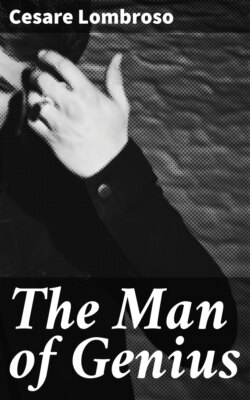Читать книгу The Man of Genius - Cesare Lombroso - Страница 4
На сайте Литреса книга снята с продажи.
Оглавление“Excludit sanos Helicone poetas Democritus.”[7]
It was, evidently, the observation of these facts, wrongly interpreted and, according to a common habit, transformed into superstitions, which caused ancient nations to venerate the insane as beings inspired from on high. We possess not only the witness of history to this effect, but also that of the words navi and mesugan in Hebrew and nigrata in Sanscrit, in which the ideas of insanity and prophecy are confused and assimilated.
Felix Plater affirmed that he had known persons who, although they excelled in certain arts, were yet mad, and betrayed their infirmity by a curious seeking for praise, and by strange and indecent acts. He had known at Court an architect, a celebrated sculptor, and a distinguished musician, who were mad.[8]
Pascal, later on, repeated that extreme intelligence was very near to extreme madness, and himself offered an example of it. Diderot wrote: “I conjecture that these men of sombre and melancholy temperament only owed that extraordinary and almost Divine penetration which they possessed at intervals, and which led them to ideas, sometimes so mad and sometimes so sublime, to a periodical derangement of the organism. They then believed themselves inspired, and were insane. Their attacks were preceded by a kind of brutish apathy, which they regarded as the natural condition of fallen man. Lifted out of this lethargy by the tumult within them, they imagined that it was Divinity, which came down to visit and exercise them.... Oh! how near are genius and madness! Those whom heaven has branded for evil or for good are more or less subject to these symptoms; they reveal them more or less frequently, more or less violently. Men imprison them and chain them, or raise statues to them.”[9]
Many examples of men who were at once mad and highly intelligent were offered by Hécart in his Stultitiana, ou petite bibliographie des Fous de Valenciennes, par un homme en démence; by Delepierre, an enthusiastic bibliophile, in his curious Histoire littéraire des Fous (1860); by Forgues, in Revue de Paris (1826); and by an anonymous writer in Sketches of Bedlam (London, 1873).
On the other hand, it was shown in Lélut’s Démon de Socrate (1836) and Amulette de Pascal (1846), in Verga’s Lipemania del Tasso (1850) and in my own Pazzia di Cardano (1856), that there are men of genius who have long been subject to hallucinations, and even to monomania. Other proofs, the more precious because impartial, were supplied by Réveillé-Parise, in his Physiologie et Hygiène des hommes livrés aux travaux de l’esprit (1856). Moreau (de Tours), who delighted in the least verisimilar aspects of truth, in his solid monograph, Psychologie Morbide (1859), and J. A. Schilling, in his Psychiatrische Briefe (1863), endeavoured to show, by researches that were very copious although not very strict in method, that genius is always a neurosis, and often a true insanity. Hagen has more recently sought to prove a thesis which is partly the same in his Verwandtschaft des Genies mit dem Irrsinn (Berlin, 1877), and, indirectly, Jürgen-Meyer, in his admirable monograph, Genie und Talent (from the Zeitschrift für Völker-psychologie, 1879). These two writers have tried to explain the physiology of genius, and, singularly, they have reached conclusions which were reached, more by intuition than through close observation, by an Italian Jesuit, now quite forgotten—Bettinelli—in his book, Dell’ entusiasmo nelle belle Arti (Milan, 1769).
Radestock, in his Genie und Wahnsinn (Breslau, 1884), added little to the solution of the problem, as he merely copied, for the most part, from his predecessors, without profiting greatly by their work.
Among recent writers, I note Tarnowski and Tchukinova, who to the Russian translation of my book (St. Petersburg, 1885) have added many new documents from the history of Russian literature; Maxime du Camp, who in his curious Souvenirs Littéraires (1887), has shown how many modern French writers have concealed within them the sorrowful seed of insanity; Ramos Mejia, who, in his Neurosis de los Hombres Celebres de la Historia Argentina (Buenos Ayres, 1885), shows how nearly all the great men of the South American Republics were inebriate, neurotic, or insane; A. Tebaldi, who, in his book Ragione e Pazzia (Milan, 1884), brings fresh documents to the literature of insanity; and, finally, that acute thinker and brilliant writer, Pisani-Dossi, who has given us a curious study,[10] which is a monograph on madness in art; as in my Tre Tribuni (1889) I have attempted to do with the insane and semi-insane in their relation to politics.
